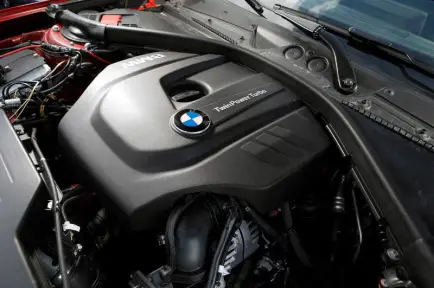
Certain BMW models have gained a reputation for their engine failures. The 116i with its B38 engine is a prime example. The notorious timing chain failures are a major issue, causing many vehicles to break down before reaching 62,000 miles.
Despite the high number of failures, BMW did not initiate a recall; they only repaired the defective components for a certain period as a goodwill gesture.
General Information about the 116i
The 116i was available with both four-cylinder and three-cylinder engines.
Particularly, the three-cylinder B38 engine is infamous for its timing chain issues. The timing chain has earned a reputation for being a major cause of engine damage, as a break in the chain immediately results in significant engine damage.
The following sections discuss the problems of the 116i engine variations and whether a replacement engine is worth it for damage repair.
Signs of Engine Damage
Engine damage in the 116i can manifest differently, but a common symptom is a rattling noise. This noise often occurs during a cold start but typically disappears once the engine warms up. If you hear this, the timing chain hasn't jumped or broken yet. However, it should not be ignored as it can suddenly lead to major engine damage.
If the engine warning light also illuminates, the timing chain has likely stretched. But, the damage might not necessarily come from the chain! It could also be due to the chain tensioner. This is one of the main issues with the 116i since it can wear out significantly and be responsible for a series of chain-related damages.
If you hear a loud bang while driving, the timing chain has likely snapped. In this case, stop immediately and turn off the engine. If the chain breaks, the valves collide with the pistons. Do not restart the engine and have the vehicle transported to the nearest garage.

Pay attention to other noises from the engine compartment. A knocking or thudding sound is another sign of engine damage.
As known with some three-cylinder models, it's essential to monitor the coolant level closely. Given the compact engine's extreme thermal conditions, a drop in coolant level could indicate damage.
Keep a close eye on oil loss. While BMWs are known for high oil consumption, overlooking excessive consumption can be a mistake. Significant oil loss can suggest various damages, which can critically harm the engine. Excessive or blue smoke from the exhaust indicates oil in the combustion cycle.
Changing the Timing Chain on the BMW 116i
If the chain has already snapped, you're facing major engine damage and a simple replacement won't suffice.
However, if engine damage hasn't occurred yet, repair costs can often be reasonable.
The timing chain in the 116i models often gives out below 62,000 miles. Therefore, it's advisable to inspect the chain from 56,000 miles onwards. Moreover, always listen for rattling from the engine compartment. This could indicate a stretched chain or a worn-out chain tensioner.

If the chain skips or breaks, the pistons collide with the open valves, causing immediate engine damage. Components like pistons, valves, and camshaft get damaged and need replacement before restarting the engine.
Hence, replacing the chain before any damage occurs can help minimize repair costs.
Common Damages and Solutions
While engine repair and buying engines with damage are options, replacement engines are often the best solution. A frequent issue with the BMW 116i engine is a faulty cylinder head.

This can lead to hard-to-locate hairline cracks. These cracks can decrease compression within the combustion chamber, causing significant power loss. Cracks can also allow coolant or oil to enter the combustion process.
Additionally, three-cylinder engines often overheat. This can be due to damaged coolant hoses or front cover gaskets, resulting in coolant leakage.
Given that the aforementioned timing chain issues can destroy several components, replacement engines are a popular choice. Typically, multiple parts need replacing, necessitating a complete engine disassembly. This process is time-consuming, and there's no guarantee of the engine's proper functioning post-repair. Thus, replacement engines are the preferred option, but each case should be assessed individually.
We've only described the most common problems with the BMW 116i. You can read the full list of complaints from other users here.
Same articles

Understanding Vehicle Inspection and Verification Services: Why They Matter for Every Driver
GuidesVehicle inspection and verification services are an essential but often overlooked part of keeping roads safe and cars legally compliant. Most people only think about inspections when it’s...
KLIFEX Brand Overview: High-Quality Automotive Repair Kits for Affordable Repairs
GuidesThe automotive aftermarket has long needed solutions that combine reliability, durability, and affordability. Many car enthusiasts and services are looking for a way...
Fast, Reliable Vehicle Emissions & Inspection Services Made Simple
GuidesFast, reliable emissions and inspection services are essential for keeping vehicles road-ready, compliant with environmental regulations, and safe for daily driving. If you’re looking for quick...

